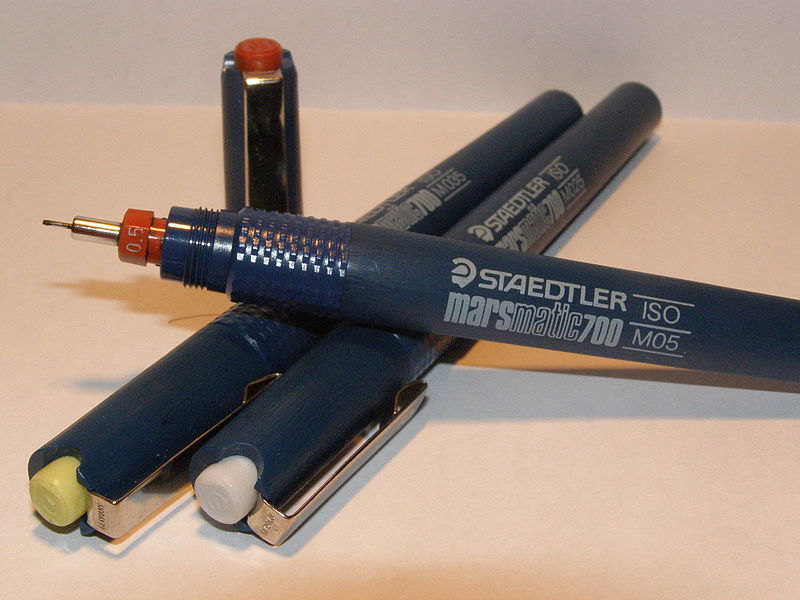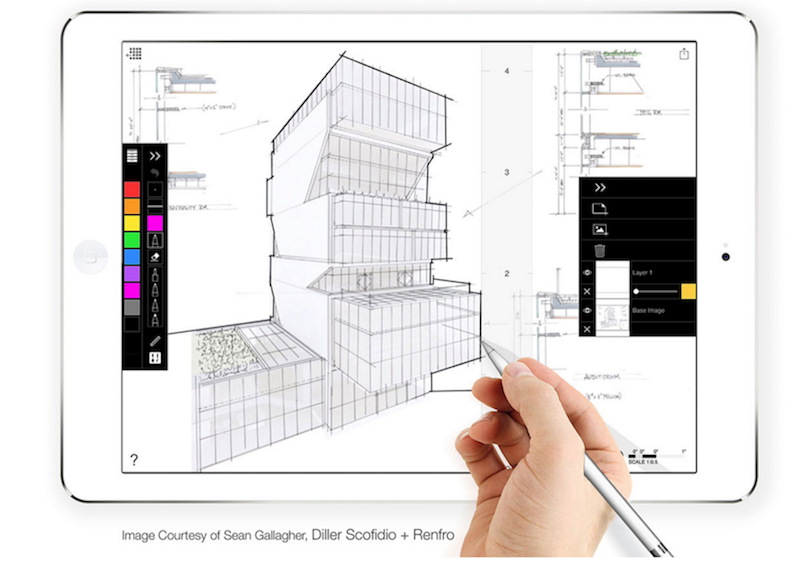They say it is a poor carpenter who blames his tools. But what if he isn’t blaming the tools, but praising them? That is the question Morpholio seems to have been asking itself when designing a technical pen for architects and designers in the modern age. A pen Morpholio hopes will be praised for making the lives of these architects and designers much easier.
As CAD software took over in the 90s and early 2000s, pen sets went the way of the dodo, and the art of hand drafting went along for the ride. But as architecturelab.net reports, a renaissance of architects using hand drawing and sketching as part of their process, thanks to the prevalence of touchscreens and styluses, is currently occurring.
And, as Anne Sullivan (known for being Helen Keller’s instructor) once said, “Every renaissance comes to the world with a cry, the cry to be free.” So, what are these designers and architects crying to be freed from? How about the one-size-fits-all sliders used for controlling line weight or the irksome task of constantly making note of the line weight being used for a given aspect of the drawing?
With the ability to zoom in and out of an image with a simple pinching or spreading motion of one’s fingers, a line that was perfect at one zoom level could become too thick when zoomed in our too thin when zoomed out.
That’s where Morpholio’s new ScalePen comes in. ScalePen works in tandem with Morpholio’s popular “Trace” drawing app and is described as Anna Kenoff, Morpholio Co-creator, as “an entirely new opportunity for architectural drawing.” The key feature associated with ScalePen is that it eliminates the need for the user to keep records of their pen weight. Instead, the software does the tedious pen-related bookkeeping itself.

Depending on the drawing scale and the zoom level, ScalePen continuously and automatically assigns a calibrated set of technical pens and pen sizes. Zoom in to a specific spot in the drawing and ScalePen will adjust. Zoom out or change the scale, and the pen sizes change too. The result of all of this dynamic change is that it saves time for the designer or architect and creates uniformity among line weight.
For example, a designer can zoom in on a site plan at 1/16-inch scale and draw specific details on one of their designs using a set of ten pen sizes. When finished, the designer can zoom out to, say, ¼-inch scale, and be gifted with a new set of ten pen sizes and add some additional details. Finally, the designer can zoom out to the original scale and be presented with the same ten pens they had at the start and continue on their merry way.
As Morpholio Co-creator Toru Hasegawa told architectmagazine.com, “No matter what zoom level you are in, there is a thinnest line and a thickest line relative to that zoom level.” Ah, the magic of the digital age.
The patent-pending ScalePen works with eight pen types, including pencil, charcoal, and brush, providing even more specificity and possibility for the designer/architect and making the tool even more useful. While it might still be unbecoming to blame the tools for any user-related shortcomings, Morpholio probably wouldn’t mind being praised for the opposite.
Related Stories
| May 22, 2013
Return of retail? Rent growth seen in recovering markets
Like digging a ditch with a spoon, retail demand driven by population growth has eaten away at the supply of available store space in the markets that have been slowest to recover from the downturn. Vacancy rates are reaching a point that will give at least some landlords in every market the clout to demand slightly higher rents.
| May 22, 2013
New ASTM standard enhances hollow structural sections
ASTM A1085 is a big step forward in simplifying HSS design and usage, thereby making it a more desirable option for HSS.
| May 22, 2013
Architecture billings take a step back in April, ending growth streak
For the first time in 10 months, the AIA's Architecture Billings Index slipped into negative territory, falling to 48.6 in April, down from 51.9 the previous month. This is the ABI's lowest mark since July 2012.
| May 21, 2013
Foster + Partners reveals plans for London residential towers
British firm Foster + Partners has unveiled plans for two residential skyscrapers as part of a mixed-use development in north London.
| May 21, 2013
RSMeans cost comparisons: pools, racquetball courts, bowling alleys, hockey/soccer facilities
Construction market analysts from RSMeans offer construction costs per square foot for four building types across 25 metro markets.
| May 21, 2013
7 tile trends for 2013: Touch-sensitive glazes, metallic tones among top styles
Tile of Spain consultant and ceramic tile expert Ryan Fasan presented his "What's Trending in Tile" roundup at the Coverings 2013 show in Atlanta earlier this month. Here's an overview of Fasan's emerging tile trends for 2013.
| May 20, 2013
4 emerging trends in parking structure design
Survey of parking professionals reveals how technology is transforming the parking industry.
| May 20, 2013
Jones Lang LaSalle: All U.S. real estate sectors to post gains in 2013—even retail
With healthier job growth numbers and construction volumes at near-historic lows, real estate experts at Jones Lang LaSalle see a rosy year for U.S. commercial construction.
| May 17, 2013
First look: HKS' multipurpose stadium for Minnesota Vikings
The Minnesota Sports Facilities Authority (MSFA), the Minnesota Vikings and HKS Sports & Entertainment Group have unveiled the design of the State’s new multi? purpose stadium in Minneapolis, a major milestone in getting the $975 million stadium built on time and on budget.
















